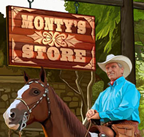I have experienced two different horses napping on the long lines in separate sessions, one was known to nap when riding but the other never does (no matter how long the session). Both started out fine, responding to pressure-release and executing nice turns and circles etc in 3 gaits. Both were a little unfit and it seems to be that when they got tired that was when the napping started (bear in mind my sessions aren't overly long and I have been on an intro course covering long-lining too).
They were slightly different in approach but both stopped dead, turned their heads away from me and if I continued encouraging them to move they would rear-end me (one even took a step backwards, I'm not going in the kick zone thank you!) No amount of flapping, movement, line flicking/slapping would work and I do not want to get frustrated or cross with the horse as this might look like agression to him/her.
Some people on the forum have suggested putting the wip wop on a stick or shaking a plastic bottle filled with coins but I would very much like to see how Monty would handle such a situation. Thank you.




Hi
As both have 'stopped dead and turned away from you' it sounds very much like you have accidentally 'got in their way' i.e. you have stepped in front of them to signal them to turn - are you doing this in a round pen? I suspect that they are then not sure what to do and have become frustrated; as Monty says, it's important to check what we are doing ourselves first - it's always difficult with a verbal description to see whats happening :-) If you are able to video it and put onto You Tube we could look at it and see. I find long lining is an underestimated skill (and of course Monty makes it look easy!!) and it can be tiring for the human too, particularly when trying to get the timing and precision right.
I'm with viccihh1 on the frustration part.
Though I can't possibly say what caused their frustration, I have a suggestion on how to try to break it: take his balance!
.
When napping happens, whether the horse is challenging your leadership or out of sheer frustration, the horse is usually determined not to let himself be affected by anything you will try from the driving position, so any amount of "shake, rattle and roll" will only serve to aggravate him (and you) all the more.
.
So instead of remaining in your driving position, get the outer line across the back (for safety) and walk up to his head. Take a hold of the inner line a feet or so from the bit and walk back in a wide half circle away from the horse's front end so it has to turn its head to follow the rein. At a certain point it will have to move a leg and once it does you try to keep it moving with you.
Keep hold of the outer rein to stop him from making a full turn and end up on your off side!
.
If he stops again or refuse you; change direction by walking on that same half circle across its path and over to the other side. Continue this until he moves that foot.
Don't tug, just gentle pressure.
.
Once you have him moving, walk him for a bit (repeat taking his balance if he stops) and then attempt to resume your driving position by moving further out on the line and let him pass you. If/once it works, don't start over with the session, but be content with a turn or two, reward and end the session on that good note.
Hi tessahoran,
Since you did an Intro-course, why don't you send in your video to your Instructor and ask for feedback! This will bring you the answer your looking for and suggestions on how to avoid a situation as discribed.
Let us know how you're doing,
Miriam
Dear All, wonderful to hear you are trying and getting good!
I will put up a video clip on youtube for you about the long lining.
There is one thing we might not think about - the horse will always communicate with us wether we are on the ground or on the back.
The signs you get in a Join-Up, you will get as well when long lining for example.
When the 4 signs has been established, you will feel the horse wants to walk a little - you reward the communication before raising the bar and work more on the lines, just as if you were riding. Ask for work, then a little relaxed walk on long reins,, then work again.
If you have long lined a couple of times it often is enough to draw your eyes down to the hocks as a "thank you" for communicating and working and then go back up with your eyes on eyes and work.
It is a good thing to start the work on "the easy lap" for the horse - they are also left or right handed so to speak.
Then count your laps - extend the workload on the more difficult lap and work from there.
I always teach my students that it is the middle part of your body the horse will read. And if you want an excuse for playing video games (!) there is a super Wii program for finding you inner balance before going out long lining.
Horses that are "worked on the lines" still get information from your projecting energy - not only from the lines.
When you can get your feel, energy and movements as if you were sitting in the saddle, then it is a LOT of fun!
See you soon on youtube!
Warmest Ann